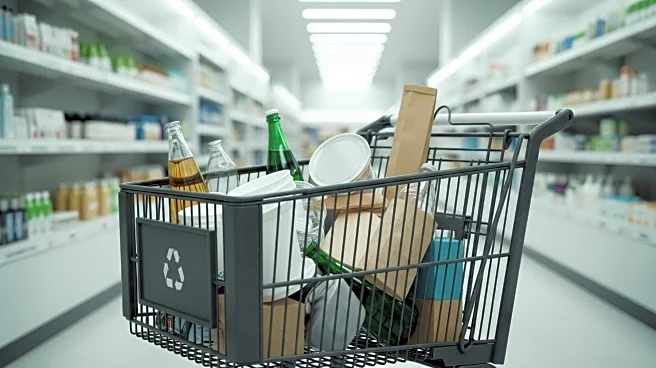What is the story about?
What's Happening?
UK retailers are set to pass on the majority of costs from the new Extended Producer Responsibility (EPR) legislation to consumers, according to the British Retail Consortium (BRC). The EPR requires producers to report packaging usage and pay fees based on tonnage, with the legislation effective since January 2025. The BRC survey indicates that over 80% of these costs will be transferred to shoppers, adding to inflationary pressures amid existing food inflation. Retailers are striving to use more recyclable materials and reduce packaging volume, but face increased administrative burdens due to EPR compliance.
Why It's Important?
The EPR scheme represents a significant shift in how packaging waste is managed, aiming to hold producers accountable for environmental impacts. However, the financial burden on consumers during a cost-of-living crisis raises concerns about affordability and transparency. The BRC's call for government clarity on the benefits of EPR highlights the need for effective use of funds to improve recycling systems. The scheme's impact on food inflation could affect consumer spending and economic stability, while encouraging retailers to adopt sustainable practices may drive innovation in packaging solutions.
What's Next?
The BRC is urging the UK government to ensure that EPR funds are used transparently and effectively, benefiting both consumers and the environment. Legal restrictions on fund usage could enhance local recycling systems, potentially reducing long-term environmental impacts. As retailers adapt to EPR requirements, further innovations in sustainable packaging are expected, potentially influencing industry standards. The ongoing dialogue between the BRC and government may lead to policy adjustments, addressing concerns about cost distribution and environmental benefits.
Beyond the Headlines
The EPR scheme underscores the broader challenge of balancing environmental responsibility with economic pressures. The initiative may prompt discussions on the ethical implications of passing costs to consumers, particularly during economic hardship. As retailers navigate compliance, the focus on sustainable packaging could drive technological advancements and new business models. The scheme's implementation may also influence international approaches to producer responsibility, encouraging global collaboration on waste management and sustainability.
















